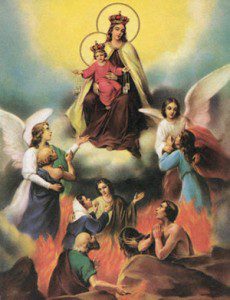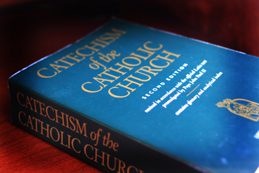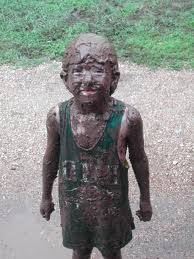
Being military, my family moves often. This comes with its advantages: we have seen different parts of the country; we have friends everywhere, making it easier to find a place to stay when we travel; and if we really dislike a place, we do not have to live there long. Unfortunately, this also means we do not have an established community of Catholic friends outside of Facebook. At times this can be difficult, as we often have to explain various aspects of our Faith to curious non-Catholics to whom it is evident that we are in many ways counter-cultural. “Go and make disciples,” commanded our Lord, and so we aim to do, through hospitality, charity, and as quiet witnesses who allow others to see the light of Christ shining in all we do.
When asked what I believe, I try to respond with what the Church teaches.  This does not mean that I believe her because what she says conforms to my ideas, but rather, that when she teaches she does so with God’s Voice. This is important, for the Truth is, regardless of whether or not I believe in it. This Church, instituted by Christ and built upon Peter, has the authority to bind and loose, the authority to interpret and instruct. Being baptized in God’s name – Father, Son, and Holy Spirit – means I was baptized into the Body of Christ, a Body which is not only truly visible, but indivisible. It is universal (catholic), transcends beyond borders (including death), and is preserved generation to generation in an unbroken line until the end of time. I cannot rightly call myself a Catholic if I choose to believe and obey certain doctrines and not others; for to be selective would be to separate myself from the Church. Thus, I have never had a problem with believing in the existence of purgatory. In fact, I see it as proof of God’s abiding love and mercy.
This does not mean that I believe her because what she says conforms to my ideas, but rather, that when she teaches she does so with God’s Voice. This is important, for the Truth is, regardless of whether or not I believe in it. This Church, instituted by Christ and built upon Peter, has the authority to bind and loose, the authority to interpret and instruct. Being baptized in God’s name – Father, Son, and Holy Spirit – means I was baptized into the Body of Christ, a Body which is not only truly visible, but indivisible. It is universal (catholic), transcends beyond borders (including death), and is preserved generation to generation in an unbroken line until the end of time. I cannot rightly call myself a Catholic if I choose to believe and obey certain doctrines and not others; for to be selective would be to separate myself from the Church. Thus, I have never had a problem with believing in the existence of purgatory. In fact, I see it as proof of God’s abiding love and mercy.
I have always felt God’s love, but I did not always understand it as I do now.  When my first baby was born – as I held her, tiny, warm, and helpless in my arms shortly after giving birth – I was given a gift in addition to the gift of her precious life. In that moment, God granted me a glimpse into His heart. I gazed into her blue eyes and wept as the burning intensity of God’s love for her, for me, for all His children dwarfed the love I felt for her. This loving God would never leave us in the filth of our own sin.
When my first baby was born – as I held her, tiny, warm, and helpless in my arms shortly after giving birth – I was given a gift in addition to the gift of her precious life. In that moment, God granted me a glimpse into His heart. I gazed into her blue eyes and wept as the burning intensity of God’s love for her, for me, for all His children dwarfed the love I felt for her. This loving God would never leave us in the filth of our own sin.
 My baby is now an active, curious little girl. She and her siblings play outside nearly every day, and they tend to get dirty, as children are wont to do. Sometimes they are caked-on-muddy. When they come into the house, I do not just throw a blanket over them and seat them at the family table with their father. Nor do I change their clothes; what good would it do them to have on immaculate clothing if their bodies are not clean? I love them, so I bathe them, scrubbing off the mud. This process can be unpleasant, even painful, if they are filthy enough. One child screams in the shower like he is being tortured, but I had to use it one day, and even though it hurt him, it was the only way to get him clean. How much more does our Heavenly Father, who is perfect, do for us?
My baby is now an active, curious little girl. She and her siblings play outside nearly every day, and they tend to get dirty, as children are wont to do. Sometimes they are caked-on-muddy. When they come into the house, I do not just throw a blanket over them and seat them at the family table with their father. Nor do I change their clothes; what good would it do them to have on immaculate clothing if their bodies are not clean? I love them, so I bathe them, scrubbing off the mud. This process can be unpleasant, even painful, if they are filthy enough. One child screams in the shower like he is being tortured, but I had to use it one day, and even though it hurt him, it was the only way to get him clean. How much more does our Heavenly Father, who is perfect, do for us?
Purgatory, like other Catholic doctrines, is not isolated, but woven into the fabric of the Church. It is connected to the Communion of Saints, indulgences, and the Sacrament of Reconciliation, among other things. The Catholic Catechism explains purgatory in this way, “”All who die in God’s grace and friendship, but still imperfectly purified, are indeed assured of their eternal salvation; but after death they undergo purification, so as to achieve the holiness necessary to enter the joy of heaven. The Church gives the name purgatory to this final purification of the elect, which is entirely different from the punishment of the damned” (CCC 1030–1).
So, when I die, if I die in a state of grace with no mortal sin on my soul but still have some venial sins, I am bound for heaven because of my love for Christ. But before I can attain the Beatific Vision (before I can see God face-to-face), I must be cleansed of all attachment to sin. I must be refined, as one refines silver (Zech 13:9). I would indeed be prideful to think I can just march into heaven immediately upon death and expect to be seated at the wedding feast of the Lamb without so much as washing my hands.
Purgatory is not heaven, though those who go through it are bound for heaven. It is not hell, where we have no hope and we are eternally distanced from God. There is a third place mentioned in the Bible: a prison for spirits where Christ went to preach to them (1Peter 3:19). It is a place “in the age to come” where we can be freed of the consequences of sin (Matt. 12:32). A place where we pay off the debt incurred by our sins (Matt 18:21-35). A place where the prayers of those still on earth can help us (2 Mach. 12:38-46). It is a place where those who are destined for heaven may be saved, but “only as through fire.” (1 Cor3:15). No one is saved in hell; no one suffers in heaven, so there must be another place after death – not heaven, not hell. The Church calls this Purgatory – where through our suffering we are transformed to be more like Christ.
That we should pray for the poor souls in Purgatory is no surprise. Do we not pray for one another as Christians? Do the saints in heaven not pray for us (Rev 5:8)? And if prayer helps those poor souls who cannot help themselves, what better than the highest form of prayer – the sacrifice of the Mass, where heaven meets earth on the altar of the Lord with the angels kneeling in adoration?
